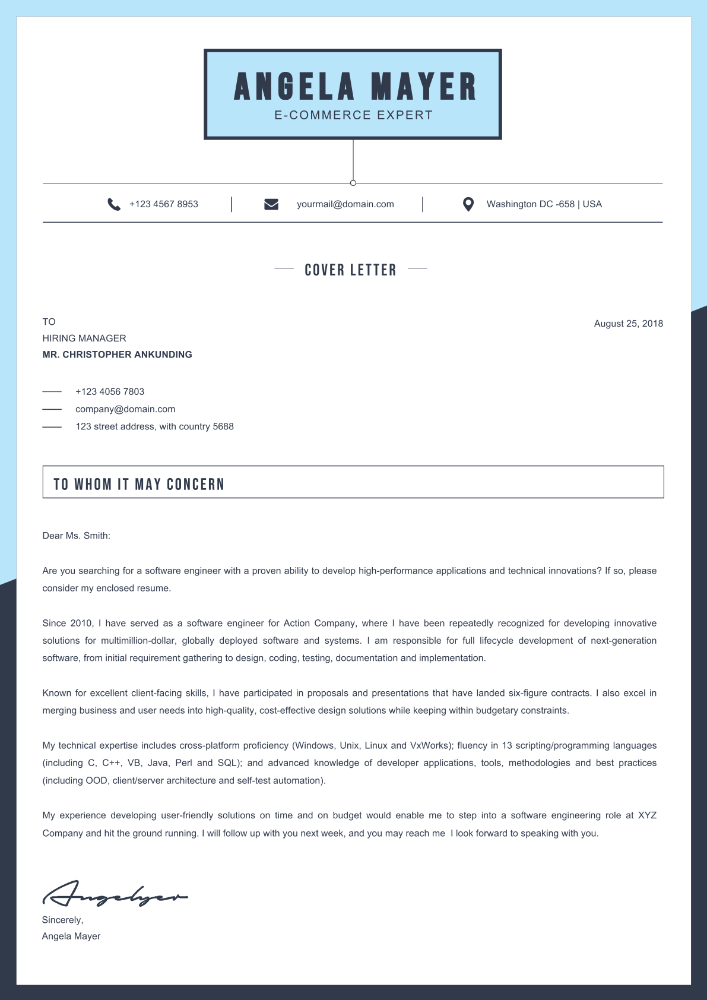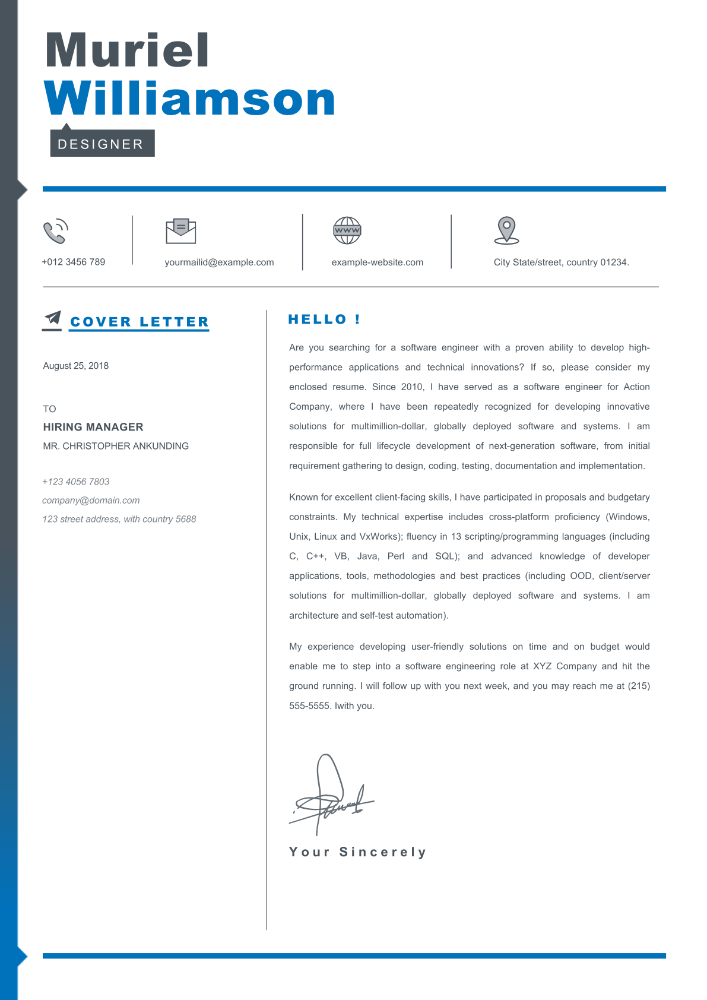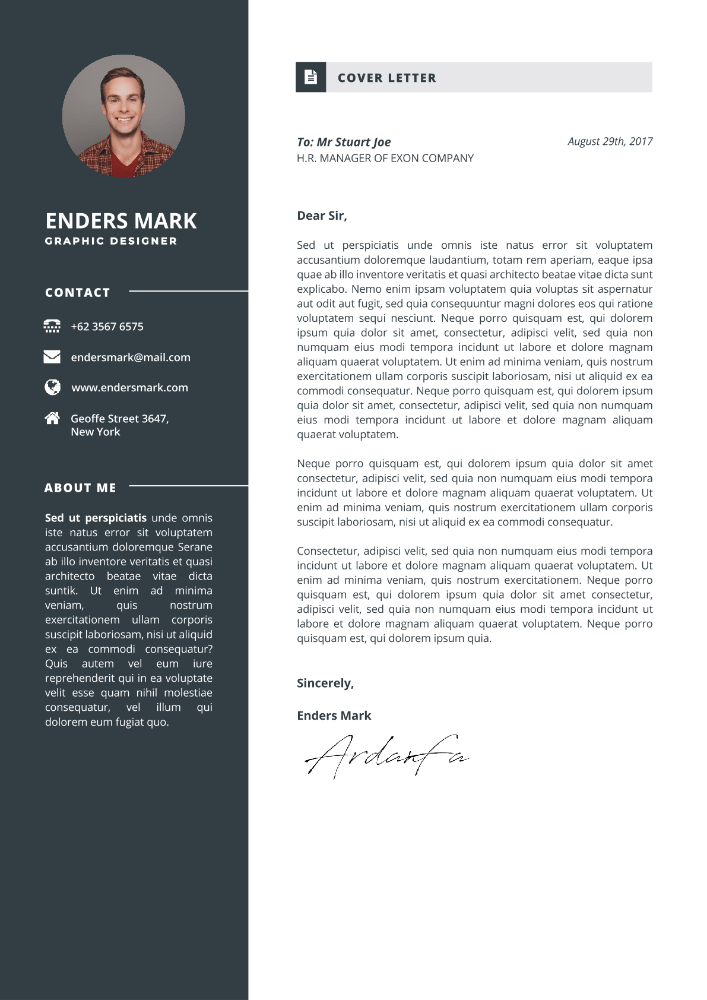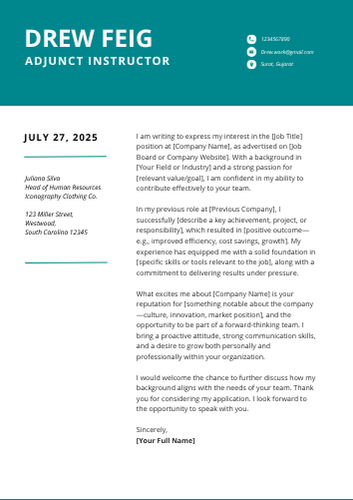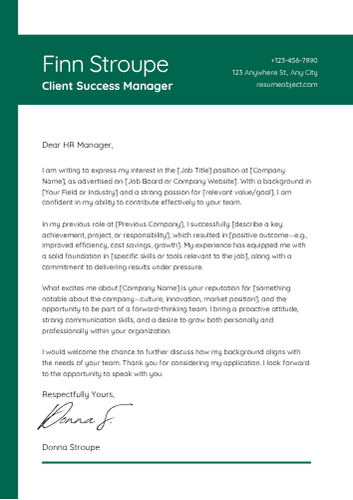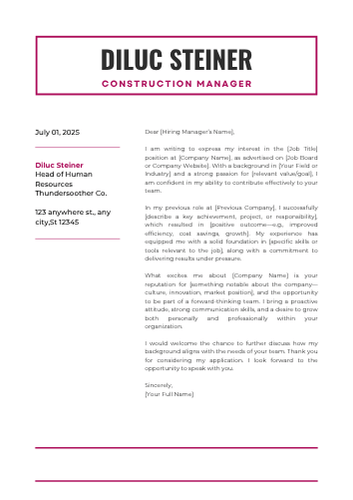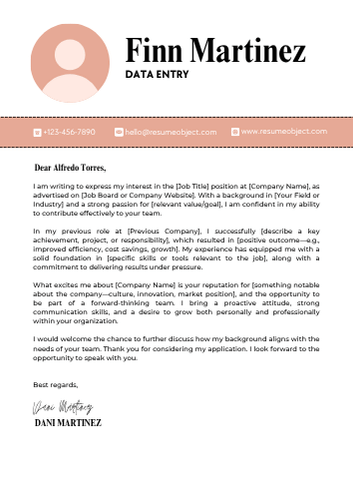Scientist Cover Letter Examples, Sample Format
Scientist Cover Letter
In the competitive field of science, a well-crafted scientist cover letter can set you apart from other candidates. This article provides a variety of examples and templates tailored for different scientific disciplines, ensuring you present your qualifications effectively.
Navigating the intricacies of a cover letter format is crucial for success. By exploring these sample formats, you'll learn how to highlight your skills and experiences, making a compelling case for your candidacy in the scientific community.
What Makes a Great Scientist Cover Letter?
A great scientist cover letter highlights relevant skills, showcases research experience, and demonstrates passion for the field, all while tailoring the message to the specific position and institution.
-
To secure a research scientist position at [Company Name] where I can leverage my expertise in molecular biology to contribute to innovative projects and drive scientific advancements.
-
To obtain a position as a data scientist at [Company Name] that allows me to utilize my analytical skills and experience in machine learning to enhance data-driven decision-making processes.
-
To join [Company Name] as a laboratory technician, utilizing my strong background in chemistry and hands-on laboratory experience to support research initiatives and ensure high-quality results.
-
To apply for a position as an environmental scientist at [Company Name], aiming to utilize my knowledge in ecological research to develop sustainable solutions and promote environmental conservation.
-
To secure a role as a clinical research scientist at [Company Name], where I can apply my expertise in clinical trial design and data analysis to contribute to groundbreaking medical research and improve patient outcomes.
For aspiring auto technicians, exploring effective cover letters is crucial. Check out these Auto Technician Cover Letter Examples, Sample Format to enhance your application and stand out.
Essential Sections of Scientist Cover Letter
A scientist cover letter should include a compelling introduction, relevant qualifications, research experience, key skills, and a strong conclusion, showcasing your passion and fit for the position.
-
Contact Information: Start with your full name, phone number, email address, and LinkedIn profile or professional website if applicable. This ensures the hiring manager can easily reach you.
-
Salutation: Address the letter to a specific person whenever possible. Use “Dear Dr. [Last Name]” or “Dear Hiring Committee” if the name is unknown.
-
Introduction: Clearly state the position you are applying for and how you learned about the opportunity. Include a brief statement about your current role or your professional identity as a scientist.
-
Research Background: Highlight your key research experiences relevant to the job. Mention specific projects, methodologies, or technologies you have worked with that align with the employer’s focus.
-
Achievements and Contributions: Showcase your most significant accomplishments, such as published papers, patents, or successful experiments. Quantify results when possible to demonstrate impact.
-
Skills and Expertise: Emphasize technical skills, laboratory techniques, data analysis tools, and any interdisciplinary knowledge that makes you a strong fit for the role.
-
Motivation and Fit: Explain why you are interested in the position and the organization. Connect your career goals with the company’s mission or ongoing projects to show alignment.
-
Collaboration and Communication: Scientists often work in teams and must communicate complex ideas clearly. Mention any experience with teamwork, presentations, or scientific writing.
-
Closing Statement: Reiterate your enthusiasm for the role and express your willingness to discuss your application further. Include a polite call to action, such as looking forward to an interview.
-
Signature: End with a professional closing like “Sincerely” or “Best regards,” followed by your full name.
Similar Cover Letters
Best Scientist Cover Letter Format
Discover the ideal format for crafting a standout scientist cover letter that highlights your qualifications, showcases your research experience, and captures the attention of hiring committees effectively.
- Use a professional font and size: Choose clean, easy-to-read fonts like Arial, Calibri, or Times New Roman in 10-12 point size to ensure clarity and professionalism.
- Include your contact information at the top: Clearly list your name, phone number, email address, and LinkedIn profile or professional website, aligned to the left or centered.
- Address the letter to a specific person: Whenever possible, find the hiring manager’s name to personalize your greeting instead of using generic salutations like "To Whom It May Concern."
- Keep the layout clean and organized: Use consistent margins (usually 1 inch), single spacing within paragraphs, and double spacing between paragraphs to enhance readability.
- Limit the length to one page: Concisely present your qualifications and motivations without overwhelming the reader; hiring managers often skim quickly.
- Use clear section breaks: Separate your introduction, body, and conclusion with distinct paragraphs to guide the reader smoothly through your message.
- Highlight relevant skills and achievements: Use bullet points or brief statements to emphasize key scientific skills, research experience, and accomplishments that align with the job description.
- Incorporate keywords from the job posting: Tailor your language to reflect the terminology and requirements listed to pass applicant tracking systems (ATS) and capture attention.
- Maintain a formal tone with a touch of enthusiasm: Balance professionalism with genuine interest in the role and institution to engage the reader emotionally.
- Include a strong closing statement: End with a call to action, expressing eagerness for an interview and appreciation for the reader’s time.
- Proofread thoroughly: Check for spelling, grammar, and formatting errors to present yourself as detail-oriented and meticulous—qualities essential for scientists.
- Save and send as a PDF: Preserve formatting integrity by submitting your cover letter in PDF format unless otherwise specified.
Entry-Level Scientist Cover Letter (No Experience)
Looking to land your first science job? Check out this sample entry-level scientist cover letter! It’s a great starting point to showcase your passion, skills, and eagerness to contribute to the scientific community.
Sample #1
[Your Name]
[Your Address]
[City, State, ZIP Code]
[Email Address]
[Phone Number]
[Date]
Hiring Manager
[Company Name]
[Company Address]
[City, State, ZIP Code]
Dear Hiring Manager,
I am writing to express my interest in the Entry-Level Scientist position at [Company Name], as advertised. I recently graduated with a Bachelor of Science in Biology from [University Name], and while I may not have formal industry experience, I am eager to apply my strong academic background and passion for scientific research to contribute to your team.
During my academic career, I developed a solid foundation in laboratory techniques, data analysis, and scientific methodology. My senior project involved extensive research on [briefly describe project], where I honed my skills in experimental design and critical thinking. Additionally, my coursework in molecular biology, chemistry, and biostatistics has prepared me to quickly adapt and thrive in a fast-paced research environment.
I am particularly drawn to [Company Name] because of your commitment to innovation and excellence in scientific discovery. I am confident that my enthusiasm, attention to detail, and willingness to learn will make me a valuable asset to your team.
Thank you for considering my application. I look forward to the opportunity to discuss how my background and skills align with the goals of [Company Name]. Please feel free to contact me at [Phone Number] or [Email Address] to schedule an interview.
Sincerely,
[Your Name]
Scientist Sample Cover Letter (Experienced)
This sample mid-level scientist cover letter showcases the candidate's relevant experience, technical expertise, and passion for research, effectively highlighting their qualifications to potential employers while demonstrating strong communication skills and professionalism.
Sample #2
Dr. Jane Smith
123 Science Lane
Innovate City, ST 12345
[email protected]
(123) 456-7890
April 27, 2024
Hiring Manager
Advanced Research Institute
456 Discovery Drive
Innovate City, ST 12345
Dear Hiring Manager,
I am writing to express my interest in the Experienced Scientist position at Advanced Research Institute. With over 10 years of extensive experience in molecular biology and biochemistry, I have consistently driven innovative research projects that have led to significant breakthroughs in genetic engineering and drug development.
At my current role with BioGen Labs, I lead a team focused on developing cutting-edge gene therapy techniques, resulting in three patents and multiple peer-reviewed publications. My expertise in experimental design, data analysis, and cross-functional collaboration has enabled me to deliver results that exceed expectations and contribute to the advancement of medical science.
I am particularly drawn to Advanced Research Institute because of your commitment to pioneering solutions that improve human health. I am confident that my strong background in molecular techniques, combined with my passion for discovery and problem-solving, would make me a valuable asset to your research team.
I look forward to the opportunity to discuss how my skills and experiences align with your goals. Thank you for considering my application.
Sincerely,
Dr. Jane Smith
Scientist Cover Letter (Career Change or Gap in Employment)
Looking for a standout cover letter for a senior-level scientist position? Check out our sample format that highlights your expertise, showcases your achievements, and grabs the attention of hiring managers in a professional yet engaging way.
Sample #3
[Your Name]
[Your Address]
[City, State, ZIP Code]
[Email Address]
[Phone Number]
[Date]
Hiring Manager
[Company Name]
[Company Address]
[City, State, ZIP Code]
Dear Hiring Manager,
I am writing to express my interest in the Scientist position at [Company Name]. With a strong background in biological research and a recent career transition, I bring a unique blend of skills and fresh perspectives that I am eager to contribute to your innovative team.
Although I have taken a career break to focus on personal development and enhance my technical expertise, during this period I completed advanced courses in molecular biology and data analysis, which have sharpened my research capabilities. My previous role as a research assistant involved designing experiments, analyzing complex data, and collaborating with multidisciplinary teams to achieve project goals. These experiences have equipped me with a solid foundation in scientific methodology and problem-solving.
I am particularly drawn to [Company Name] because of your commitment to cutting-edge research and impactful solutions. I am confident that my dedication, combined with my updated skill set, will allow me to contribute meaningfully to your ongoing projects.
Thank you for considering my application. I look forward to the opportunity to discuss how my background and passion for science align with your team’s needs.
Sincerely,
[Your Name]
Cover Letter Tips to Draft Scientist Cover Letter
Do
Do: Tailor your letter to the specific job and institution – Research the organization and mention how your skills and experiences align with their goals and projects.
Do: Highlight your key scientific achievements – Briefly showcase your most relevant research, publications, or breakthroughs that demonstrate your expertise.
Do: Showcase your problem-solving skills and innovation – Provide examples of how you approached challenges creatively and contributed to advancing scientific knowledge.
Do: Express enthusiasm and fit for the role – Convey genuine interest in the position and explain why you are motivated to join their team and contribute.
Do: End with a clear call to action – Politely request an interview or meeting to discuss how you can add value to their research efforts.
Don't
Don't: Use overly technical jargon that may confuse the reader; instead, aim for clear language that highlights your qualifications as a Scientist.
Don't: Write a generic cover letter; tailor your message to the specific job and institution to showcase your genuine interest as a Scientist.
Don't: Focus solely on your academic achievements; emphasize how your skills can benefit the organization and contribute to its goals as a Scientist.
Don't: Neglect to proofread your letter; typos and grammatical errors can undermine your professionalism as a Scientist.
Don't: Make it all about you; instead, connect your experiences to the needs of the employer, demonstrating how you can add value as a Scientist.
Download Scientist Cover Letter Templates
Unlock your potential with our free scientist cover letter templates! Tailored to highlight your skills and experience, these professionally crafted designs will help you stand out in your job applications and make a lasting impression. Download now!
FAQs about Scientist Cover Letter
What key skills should I highlight in my Scientist cover letter?
Highlight skills such as analytical thinking, problem-solving, attention to detail, proficiency in relevant technologies and methodologies, effective communication, teamwork, and adaptability. Emphasize your research experience, data analysis capabilities, and any specialized knowledge pertinent to the role, showcasing how these skills align with the job requirements.
How do I tailor my cover letter for a specific scientific position?
To tailor your cover letter for a specific scientific position, research the organization and its projects. Highlight relevant skills and experiences that align with the job description. Use specific examples to demonstrate your expertise and enthusiasm for the role, ensuring your passion for the field shines through.
What format should I use for my Scientist cover letter?
Use a professional format for your Scientist cover letter. Start with your contact information, followed by the date and the employer's details. Use a formal greeting, maintain clear and concise paragraphs, and close with a strong call to action. Keep it to one page, using a readable font.
How can I effectively demonstrate my research experience in my cover letter?
Highlight specific projects, methodologies, and outcomes related to your research. Use quantifiable results to showcase impact, and connect your experience to the job requirements. Emphasize skills gained, such as data analysis or collaboration, and convey your passion for research to engage the reader effectively.
Should I include publications and presentations in my Scientist cover letter?
Yes, including publications and presentations in your Scientist cover letter is beneficial. It showcases your expertise, research contributions, and communication skills. Highlighting relevant work demonstrates your qualifications and commitment to the field, making your application more compelling to potential employers.
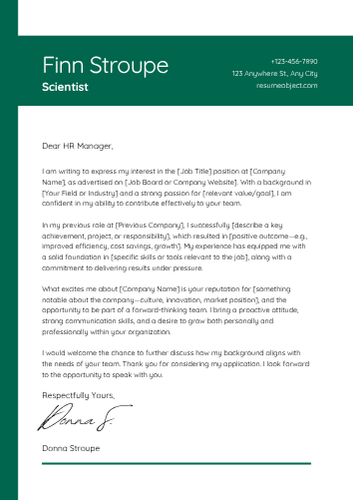
Scientist Cover Letter
Objective
Dedicated scientist with expertise in research and data analysis, seeking to leverage innovative problem-solving skills and a passion for discovery to contribute to groundbreaking projects at [Company Name].
Summary
Dedicated scientist with extensive research experience, adept at data analysis and innovative problem-solving. Passionate about advancing scientific knowledge and eager to contribute expertise to drive impactful discoveries in your organization.
Top Required Skills
Analytical skills
Research proficiency
Technical expertise
Communication skills
Problem-solving abilities
Mistakes to Avoid
Failing to tailor the cover letter to the specific research position and organization.
Overloading with technical jargon without explaining relevance to the role.
Neglecting to highlight key accomplishments and relevant experiences succinctly.
Important Points to Add
Relevant research experience and expertise in the specific scientific field.
Demonstrated ability to analyze data and present findings effectively.
Strong collaboration and communication skills within multidisciplinary teams.
View More Templates
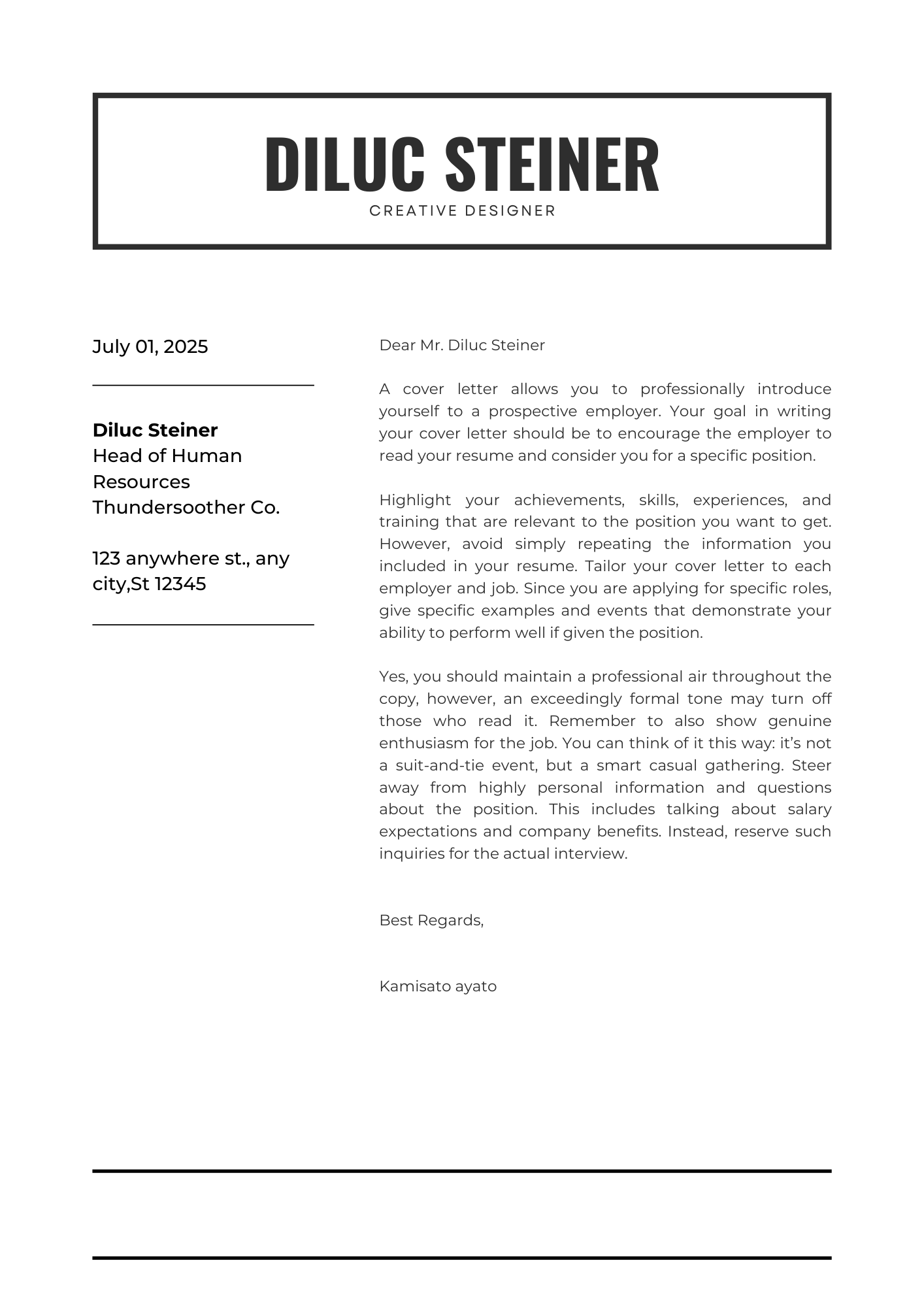 Free Cover Letter Templates
Free Cover Letter Templates

